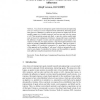Free Online Productivity Tools
i2Speak
i2Symbol
i2OCR
iTex2Img
iWeb2Print
iWeb2Shot
i2Type
iPdf2Split
iPdf2Merge
i2Bopomofo
i2Arabic
i2Style
i2Image
i2PDF
iLatex2Rtf
Sci2ools
106
click to vote
DAGSTUHL
2007
2007
Towards a Logic of Graded Normativity and Norm Adherence
A key focus of contemporary agent-oriented research and engineering is on open multiagent systems composed of truly autonomous, interacting agents. This poses new challenges, as entities in open systems are usually more or less mentally opaque (e.g., possibly insincere), and can enter and leave the system at will. Thus interactions among such black- or gray-box entities usually imply more or less severe contingencies in behavior: Among other issues, in principle, the adherence of agents to norms cannot be guaranteed in such systems. As a response to this issue, this paper proposes a logic-based approach based on the notion of (possibly probabilistic) behavioral expectations, which are stylized either as adaptive (i.e., predictive) or normative (i.e., prescriptive). Some features of this approach are the enabling of "soft norms" which are automatically weakened to some degree if contradicted at runtime, and the possibility to quantify norm adherence using the measurement of no...
Contemporary Agent-oriented Research | DAGSTUHL 2007 | Key Focus | Open Multiagent Systems | Software Engineering |
| Added | 29 Oct 2010 |
| Updated | 29 Oct 2010 |
| Type | Conference |
| Year | 2007 |
| Where | DAGSTUHL |
| Authors | Matthias Nickles |
Comments (0)

